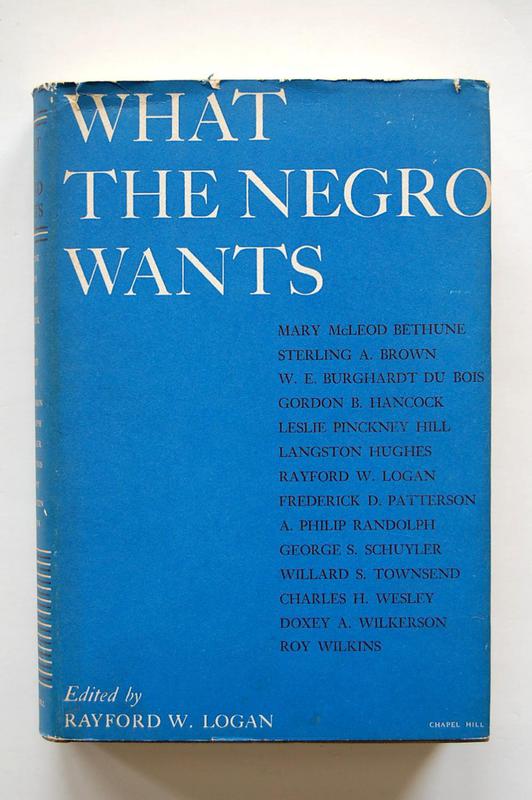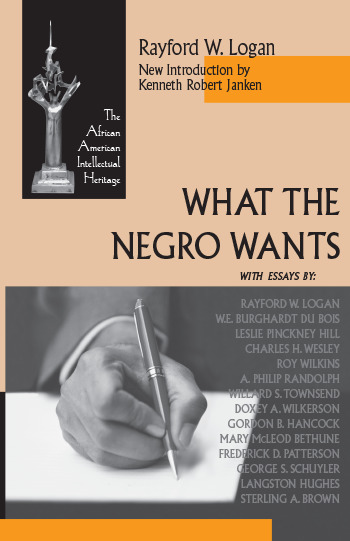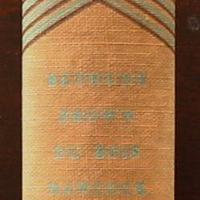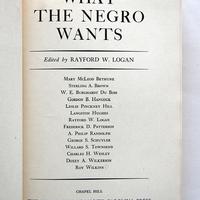-
Title
-
What the Negro Wants
-
This edition
-
"What the Negro Wants" . Ed. Rayford W. Logan. Preface W. T. Couch. Chapel Hill: U of North Carolina P, 1944. xxiii+352 pp.
-
Other editions, reprints, and translations
-
• Repr. New York: Agathon Press, 1969. 352 pp.
• Repr. with new introduction by Kenneth Robert Janken. Notre Dame: U of Notre Dame P, 2001. xxxv, xxiii, 352 pp.: "This edition includes Rayford Logan's introduction to the 1969 reprint, a new introduction by Kenneth Robert Janken, and an updated bibliography" (from U of Notre Dame P website).
-
U of Notre Dame Press
-
Table of contents
-
• Preface / W. T. Couch – Introduction / Rayford W. Logan -- The Negro wants first-class citizenship / by Rayford W. Logan -- My evolving program for Negro freedom / by W.E. Burghardt Du Bois -- What the Negro wants and how to get it: the inward power of the masses / by Leslie Pinckney Hill -- The Negro has always wanted the four freedoms / by Charles H. Wesley -- The Negro wants full equality / by Roy Wilkins -- March on Washington movement presents program for the Negro / by A. Philip Randolph -- One American problem and a possible solution / by Willard S. Townsend -- Freedom -through victory in war and peace / by Doxey A. Wilkerson -- Race relations in the United States: a summary / by Gordon B. Hancock -- "Certain unalienable rights" / by Mary McLeod Bethune -- The Negro wants full participation in the American democracy / by Frederick D. Patterson -- The Caucasian problem / by George S. Schuyler -- My America / by Langston Hughes -- Count us in / by Sterling A. Brown -- Who's who.
-
About the anthology
-
• Consists of 14 contemporary essays: so arguably a collection of essays rather than an anthology in the usual sense. Cf. "Primer for White Folks" (1945), listed in the "see also" section below.
-
Publisher's description
-
• "In 1944, distinguished Howard University historian Rayford W. Logan gathered together essays on the subject "What the Negro Wants" written by fourteen prominent African American intellectuals, including Langston Hughes, Sterling Brown, Mary McLeod Bethune, A. Philip Randolph, W. E. B. Du Bois, and Roy Wilkins. The outspoken views expressed in the essays shocked even white liberals by their unanimous call for an end to segregation. The publication of "What the Negro Wants" thus helped set the agenda for the Civil Rights Movement to come" (publisher's description, 2001 ed., from U of Notre Dame P website)
-
U of Notre Dame Press
-
Reviews and notices of anthology
-
• Holmes, Eugene (of Howard Univ.). Rev. of "What the Negro Wants", ed. Rayford W. Logan. "Journal of Negro History" 30.1 (1945): 90-92. "JSTOR".
"All of the writers say that nothing less than complete equality is what the Negro wants and intends to achieve. . . . // Logan selected the contributors, 'four of whom might be called conservatives, five liberals and five radicals.' Frankly, this reviewer does not know from the content and tenor of these essays where to place each respective writer and perhaps the unanimity of these Negro writers prompted the representative of the publishers, W. T. Couch, to write the preface which he uses to attack the essential thesis of this book" (90-91). "Couch has allowed us to witness one of the strangest spectacles in American publishing history, of soliciting a book and then using his position and prestige to attack the book" (91).
"All of the essays are well-written and up to the standards of a first-rate anthology. Most of these writers are professional writers and have been busy for half of their lives writing in defense of the Negroes' rights. . . . // The odd and disturbing notes in the book are the essays of A. Philip Randolph and George S. Schuyler. Randolph presents us with a program, the all-black March on Washington Movement with its non-violent good will action. His essay contains the only anti-Soviet and red-baiting remarks in the book. Schuyler shows himself as a racialist with a pseudo scientific account of race, though there are cogent details in his historical review of 'race.' These are the only two essays in which no mentions is made of the war" (91-92).
• "New York Herald Tribune Books" : "The conspicuous thing about the book is the spirit in which it is written, the absence of rancor and the small amount of bitterness, the reasonableness with which these men state their case, the patience with which they assume that the white man cannot forever live with his own hypocrisy" (quoted from U of Notre Dame P http://undpress.nd.edu/books/P00723 website)
• "New York Times Book Review"
• Reuter, E. B. Rev. of "What the Negro Wants." American Journal of Sociology. Transcription in W.E.B. Du Bois Papers, U of Massachusetts, Amherst
[http://credo.library.umass.edu/view/full/mums312-b104-i488]
• Reuter, E. B. (Fisk Univ.). Rev. of "What the Negro Wants", Ed. Rayford W. Logan. "Annals of the American Academy of Political and Social Science". Typescript in W. E. B. Du Bois Papers. U of Mass.-Amherst Libraries. Web http://credo.library.umass.edu/view/pageturn/mums312-b104-i489/#page/1/mode/1up .
"What the Negroes want is an opportunity to be American citizens with all the duties and obligations and all the rights and opportunities that go with life in a democratic social order. They ask for nothing that others do not have; it is difficult to see that they ask for anything that can, in reason and justice, be denied them" (n.p.)
"The emphasis of the book, in spite of its title, does not fall on what the Negroes want; that is assumed to be so simple, definite, and commonly understood as not to require elaboration. In the main, the authors are concerned with means for achieving the objective of equal status: with policies, practices, programs, organization, strategy, technique, and the related matters // that seem to characterize all social movements in their early developmental stages" (n.p.).
-
See also
-
• "A New Negro for a New Century". Comp. J. E. MacBrady. [Writings by Booker T. Washington, N. B. Wood, and Fannie Barrier Williams.] Chicago: American Publishing House, 1900. [HathiTrust https://babel.hathitrust.org/cgi/pt?id=emu.10002335905;view=1up;seq=7 ]: This earlier collection of essays—written in the wake of the Spanish-American War and its impact on "the Negro Soldier"—offered a kind of stock-taking of the progress made by African Americans since emancipation, and the forward movement envisioned for the coming years. In this vision, the removal of the barriers and injustices imposed by the white majority would need to be accompanied by the labor of self-cultivation by African American men and women, for the black community to realize the kind of advancement championed by the contributors to this collection of essays.
• "Primer for White Folks". Ed. Bucklin Moon. New York: Doubleday, Doran, 1945. 491 pp. $3.50: Reviewed by I. De A. R. "Phylon" 6.3 (1945): 288-89. "JSTOR" and reviewed, along with Louis Adamic's "A Nation of Nations", by Arthur P. Davis. "Men of Good Will." "Journal of Negro Education" 15.2 (1946): 201-04. "JSTOR": This volume, described as an "anthology" by the reviewer in "Phylon", consists of essays and stories by black and white authors on the Negro Problem. This reviewer lauds the contents of the volume, but adds: "how I wish Bucklin Moon could have included in his volume some of George Schuyler's satire, or Langston Hughes' Simple-minded Friend, or one of Rudolph Fisher's exciting short stories, or some of the significant cartoons, photographs, paintings—even recordings—that have been bringing democracy out of its nonage" (289). This reviewer also laments that, no matter how good an anthology is, it will never reach the range of readers that are influenced by the daily press: "It has to reach people who have read in their newspapers the most widely circulated article on race relations of the last 18 months. It was written by one Thurman Sensing and was entitled 'The South Has No Race Problem.' It has to reach people who read editorials entitled 'Segregation, Yes—Discrimination, No!' and believe that it is possible to have one without the other" (288).
• "The Angry Black", ed. John A. Williams (1962): see below.
• "Soon, One Morning", ed. Herbert Hill (1963): see below.
• "Beyond the Angry Black", ed. John A. Williams (1966): see below.
• Janken, Kenneth Robert. "Rayford W. Logan and the Dilemma of the African American Intellectual". Amherst: U of Massachusetts P, 1993. 336 pp. "Publisher's Weekly" describes the subject in these terms: "This interesting academic biography portrays Rayford W. Logan (1897-1982) as a scholar and "diligent second-tier leader" in the civil rights struggle. Janken, who teaches African American studies at the University of North Carolina, traces his subject's background ["sic", i.e., his adult life] as a member of Washington, D.C.'s so-called light-skinned black elite, and his embrace of Pan-Africanism after his service in WW II ["sic", should be WWI] brought him wider experience of racism. Logan worked early for voter registration and for a stronger relationship between organized labor and civil rights groups and he also edited "What the Negro Wants" (1944), a collection of essays by prominent African Americans. But he was also a history professor, teaching at Howard University from 1938 to 1968, and hence equally involved in academic projects: he briefly edited the "Journal of Negro History" and wrote "The Negro in American Life and Thought: The Nadir, 1877-1901" [1954; rev. as "The Betrayal of the Negro", 1965]. Unfortunately, Logan's earlier achievements were to be overshadowed by his vituperative campaign of his later years criticizing African Americans for identifying themselves as "black," a term he considered separatist" (from Amazon.com https://www.amazon.com/Rayford-Dilemma-African-American-Intellectual/dp/0870238582/ref=tmm_hrd_swatch_0?_encoding=UTF8&qid=&sr= ).
"Kirkus Reviews" offers this description: "Scrupulously fair and intellectually astute, Janken's (African-American Studies/Univ. of North Carolina) portrait of a lesser-known member of the black scholarly elite in the mid-20th century provides a valuable look at the man, as well as at his milieu. Although race relations in the US had been at their nadir for decades, Rayford Logan rose above his humble origins in part because his father was on the household staff of a prominent US senator--a position that protected the young Logan from the most brutal realities of a divided society. But attending Williams College in 1914 proved an eye-opener as the implications of segregation sank in, and a stint as one of Uncle Sam's segregated soldiers in WW I convinced Logan that there was a war to be waged at home. After a few congenial years in postwar Europe, he returned to America, taking up the cause of racial equality as an academic; eventually, he came to Howard University, where his reputation as a specialist in colonialism and Latin American affairs flourished. Tireless in his desegregation efforts--both as a public speaker and as chairman of the Committee for the Participation of Negroes in the National Defense Program--Logan also edited the controversial but timely What the Negro Wants (1944), a group of essays by prominent black liberals and conservatives who unanimously demanded an end to Jim Crow society. In time, however, Logan's star began to wane, and, in subsequent decades, his inability to accept the term ``black' as a replacement for his preferred ``Negro' hastened his isolation. A frank, well-founded assessment not only of personalities but also of agendas and the dynamics of power in the top tier of black America at midcentury"(from Amazon.com https://www.amazon.com/Rayford-Dilemma-African-American-Intellectual/dp/0870238582/ref=tmm_hrd_swatch_0?_encoding=UTF8&qid=&sr= ).
-
Item Number
-
A0045







